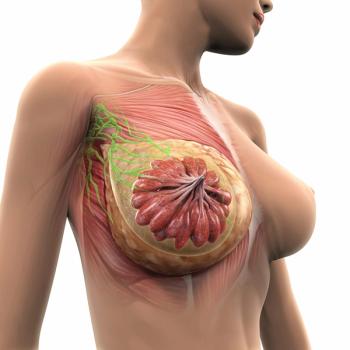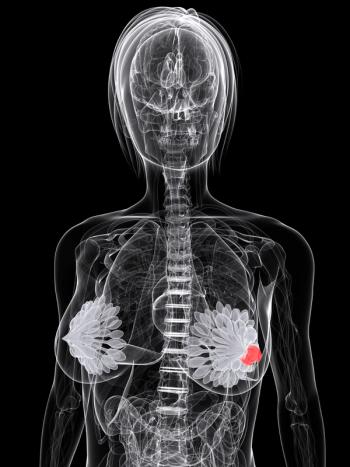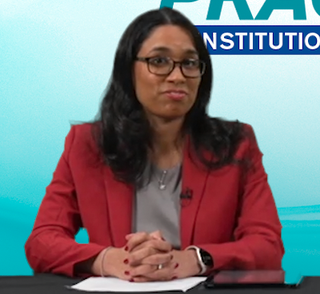
HER2-Positive Breast Cancer
Latest News
Latest Videos

CME Content
More News

Andrew Brenner, MD, presents the case of a 62-year-old patient with stage II HER2+ mBC presenting with both pulmonary and brain metastases.

Joyce O’Shaughnessy, MD, starts a conversation on managing the adverse events of tucatinib therapy in patients with HER2+ mBC with brain metastases.

The panel reviews the treatment approaches for HER2+ mBC with active brain metastases and the factors to consider during treatment decision-making.

Virginia Kaklamani, MD, presents the case of a 60-year-old patient with stage III HER2+ mBC with brain metastases.

Fam-trastuzumab deruxtecan-nxki has been recommended for approval by the European Union’s Committee for Medicinal Products for Human Use in patients with HER2-low advanced breast cancer.

Heather McArthur, MD, describes what treatment options she would consider in the third-line setting for HER2+ mBC.

Andrew Brenner, MD, explains when physicians should screen patients with HER2+ breast cancer for brain metastases.

Results from the real-world analysis of the phase 2 HER2CLIMB trial showed a good safety profile with the tucatinib triplet regimen in patients with HER2-positive metastatic breast cancer.

Patients with HER2-low or HER2-0 metastatic breast cancer who previously received at least 1 chemotherapy agent garnered similar benefit from eribulin mesylate vs standard physician's choice chemotherapies.

Trastuzumab deruxtecan improved survival outcomes vs trastuzumab emtasine in patients with HER2-positive breast cancer, according to updated results from the DESTINY-Breast03 trial.

Joyce O’Shaughnessy, MD, starts a discussion on maintenance therapy with trastuzumab deruxtecan in patient with HER2+ mBC.

Heather McArthur, MD, presents the case of a 69-year-old woman with stage II HER2+ mBC for discussion.

Patients with advanced HER2-positive breast cancer had improved progression-free and overall survival when treated with trastuzumab deruxtecan compared with capecitabin-based treatment, according to recent findings.

According to Hurvitz, the findings of trials such as DESTINY-Breast04 and TROPiCS-02 shed light on potential new therapies for breast cancer, though more research is needed to address new agents and other unmet needs.

Interim data from the phase 1/2 TACTIC-2 trial indicated that treatment with TAC01-HER2 cell therapy produced a 67% disease control rate among a cohort of patients with HER2-positive solid tumors.

The addition of capivasertib to fulvestrant resulted in a statistically significant and clinically meaningful improvement in progression-free survival for patients with hormone receptor–positive, HER2-low-or -negative locally advanced or metastatic breast cancer.

Findings from a phase 2 clinical study indicated that neoadjuvant pegylated liposomal doxorubicin plus cyclophosphamide, trastuzumab, and pertuzumab demonstrated promising efficacy and safety in the treatment of HER2-positive breast cancer.

A panel of experts in breast oncology builds a lively discussion on evolving approaches in the management of HER2+ metastatic breast cancer, including key considerations for the treatment of patients with brain metastases.

The primary end point of improved progression-free survival was met in the phase 3 DESTINY-Breast02 trial when patients with HER2-positive unresectable and/or metastatic breast cancer were given trastuzumab deruxtecan vs physician’s choice of therapy.

Based on results from the phase 3 DESTINY-Breast04 trial, the FDA has approved fam-trastuzumab deruxtecan-nxki as an intravenous infusion for patients with unresectable or metastatic HER2-low breast cancer.

Trastuzumab deruxtecan was granted priority review by the FDA for patients with unresectable advanced or metastatic HER2-low breast cancer.

European patients with unresectable or metastatic HER2-positive breast cancer are now able to receive treatment with trastuzumab deruxtecan following 1 or more previous anti-HER2 regimens.

Long-term follow-up data continue to show that patients with lymph node–positive, HER2-positive early breast cancer at a high risk of recurrence derived notable, durable benefit from treatment with adjuvant pertuzumab, trastuzumab, and chemotherapy.

Sara A. Hurvitz, MD; Stefania Maraka, MD; and Ruta Rao, MD, discuss the evolving landscape of metastatic HER2+ breast cancer, highlighting recent clinical trials and the management of patients with brain metastases.

The FDA has allowed the phase 3 FLAMINGO-01 trial assessing GLSI-100 in patients with HER2/Neu-positive breast cancer and HLA-A*02 positive to proceed following concerns related to the manufacturing and pharmacy process.






































